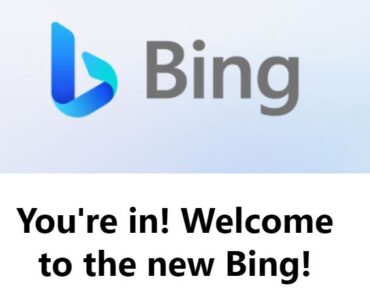The web is abuzz with the changing tides in the search engine world. On February 8, 2023 Google lost over 7% in market value (to the tune of $100 billion) after its newly introduced chatbot Bard messed up the answer to a simple question. On February 8, 2023, the stock lost nearly 5% more for a 2-day drop of over 10%. At the same time, Microsoft’s stock rose by nearly the same number of percentage points.
Microsoft has gone all-in on OpenAI’s ChatGPT, investing upwards of $10 billion according to industry reports. ChatGPT is perceived as a threat to Google’s dominance in the world of online search. The market seems to believe that Bing will gain market share in online search at the expense of Google. But is that the case?
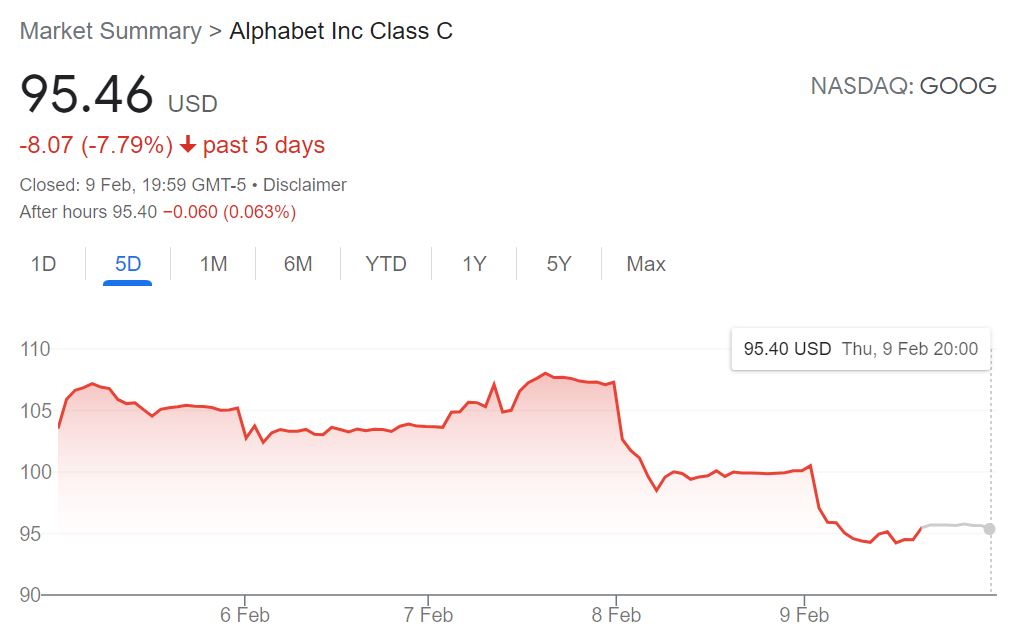
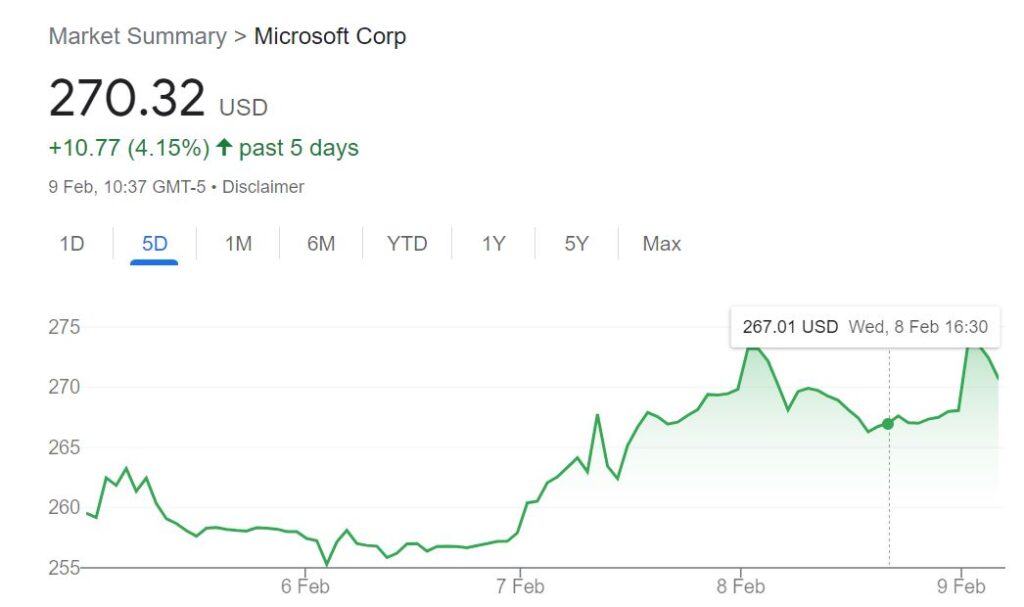
I started playing around with ChatGPT last week and was amazed at its ability to write humanoid content. By guiding the chatbot with questions and statements, people will be able to generate lots of decent quality content quickly. Bloggers, webmasters and copywriters are sure to make good use of this. But search? Initially, I did not see any similarities between ChatGPT and Google search.
But now, in what is being considered to be a game changer, Bing has integrated ChatGPT into its search engine. In fact, it appears to be the centerpiece of Bing. Because this is what you see when you open Bing.

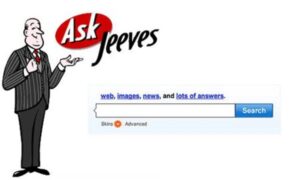 Bing is now encouraging users to ask it questions. It even urges you to try its new search engine by providing query examples from the worlds of cuisine, travel and home improvement.
Bing is now encouraging users to ask it questions. It even urges you to try its new search engine by providing query examples from the worlds of cuisine, travel and home improvement.
This seems to be a new approach to search. But is it? Internet old-timers like myself may be reminded of Ask Jeeves. Ask Jeeves, which morphed into Ask.com had to shut down after they realized that they could not compete with Google.
Is this really a game-changer?
I asked ChatGPT a question: What is neural machine translation? This is the answer I received:
Neural Machine Translation (NMT) is a type of machine translation (MT) technique that uses deep neural networks to translate text from one language to another. Unlike traditional statistical machine translation (SMT) systems, NMT models consider the complete sentence as input and generate a complete translated sentence as output, rather than translating individual words and phrases independently.
NMT models are trained on large parallel corpora, which contain millions of sentence pairs in the source and target languages, and then use this training data to learn the mapping between the source and target languages. During the translation process, the NMT model takes a sentence in the source language as input and outputs a corresponding sentence in the target language.
NMT has shown to outperform traditional SMT systems on various benchmarks and has become the state-of-the-art approach for machine translation. The use of neural networks in NMT has enabled the translation of longer sentences and improved the overall fluency and coherence of the translated text.
Cool. Assuming that this is reliable (even though OpenAI tells users to take their answers with skepticism), it is a very good service. I asked a simple question and got a textbook answer. But when I plugged the same question into Bing, I got a standard SERP. Clearly, Bing has not fully integrated ChatGPT in its search.
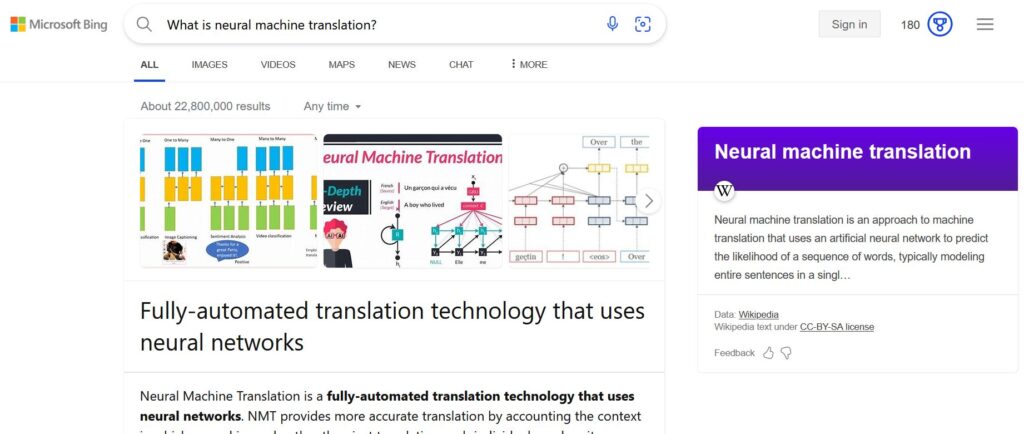
The result provided by Bing is very similar to the SERP returned by Google for the same query. They both link to Wikipedia, which usually provides reliable information.
How will this affect how people search for translation services?
Chatbots by their very nature are designed to provide automated answers to human questions. But unlike search engines, which perform a similar service, chatbots usually provide a finite answer. Unlike a search engine which provides a long list of links to external websites. True, the search engine ranks the websites in the order of importance as it sees fit. But it is up to the user to decide which information to use. Or in the commercial world, which company to choose.
People may change the way they search for information and use a more conversational approach. Which is what Bing is encouraging people to do: ask questions. But the reality is that Google has been using NLP and AI in search for a long time. And they were also using language models way before OpenAI announced ChatGPT.
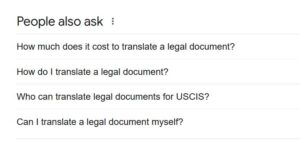
When someone types in a typical search query like: legal document translation services, they are asking for relevant information on this topic and which company to use for this service. Both Google and Bing provide a list of companies in this field. If you ask a query like what is the best company for legal document translation?, the search engine will point you to well-known B2B companies that provide their own ranking.
98% Hype and 2% Substance
After tinkering with Bing search today, I draw the conclusion that there will be little change in the way people search for translation services. Microsoft has scored a marketing coup by hitchhiking on a viral application that has captivated the minds of many. And they have also breathed new life into Bing, which only has a small fraction of the search engine and browser market. But in my estimation, Google will prevail and continue to dominate the market.



